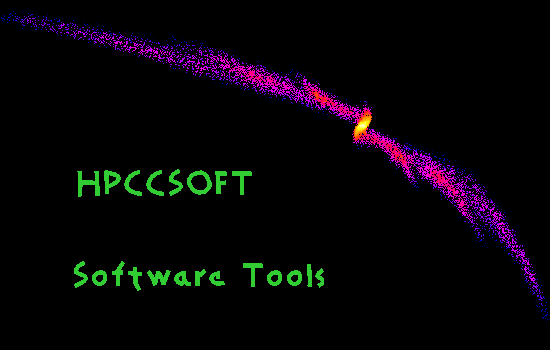

ChaNGa massively parallel N-body code
 |
 |
|
ChaNGa massively parallel N-body code |
 N-Body Home N-Body Home |
 About Us About Us |
 Search Search |
 Contact Info Contact Info |
ChaNGa (Charm N-body GrAvity solver) is a code to perform collisionless N-body simulations. It can perform cosmological simulations with periodic boundary conditions in comoving coordinates or simulations of isolated stellar systems. It also can include hydrodynamics using the Smooth Particle Hydrodynamics (SPH) technique. It uses a Barnes-Hut tree to calculate gravity, with hexadecapole expansion of nodes and Ewald summation for periodic forces. Timestepping is done with a leapfrog integrator with individual timesteps for each particle.
This release includes a number of more recent physics improvements including metal cooling , molecular hydrogen based star formation, superbubble feedback, formation and feedback from supermassive black holes, and self-interacting dark matter. This release also provides compatibility with the API for Charm++ version 6.9.0, which includes requiring the use of a C++11 compatible compiler. For GCC, this means version 4.8.1 or later. The SPH physics in this release is comparable to the SPH described in Wadsley et al, 2017.
Differences between version 3.4 and 3.3 include:
Differences between version 3.3 and 3.2 include:
Differences between version 3.2 and 3.1 include:
Differences between version 3.1 and 3.0 include:
Differences between version 3.0 and 2.0 include:
Differences between version 2.0 and 1.0 include:
ChaNGa's novel feature is the use of the Charm++ parallel programming system, including its dynamic load balancing schemes, in order to obtain high performance on massively parallel systems. It has been shown to scale well up to 512,000 processors on NCSA Blue Waters.
ChaNGa is being released under the Gnu Public License (GPL). The distribution and development repository is hosted on our N-BodyShop GitHub site. ChaNGa version 3.4 requires version 6.9.0 of Charm++ available from the UIUC PPL download site.
If you choose to use ChaNGa for scientific work, please reference the code papers:
P. Jetley, F. Gioachin, C. Mendes, L. V. Kale, and T. R. Quinn. Massively parallel cosmological simulations with ChaNGa. In Proceedings of IEEE International Parallel and Distributed Processing Symposium 2008, 2008.
P. Jetley, L. Wesolowski, F. Gioachin, L. V. Kale, and T. R. Quinn. Scaling hierarchical n-body simulations on gpu clusters. In Proceedings of the 2010 ACM/IEEE International Conference for High Performance Computing, Networking, Storage and Analysis, SC 2010, Washington, DC, USA, 2010. IEEE Computer Society.
H. Menon, L. Wesolowski, G. Zheng, P. Jetley, L. Kale, T. Quinn, F. Governato. 2015. Adaptive Techniques for Clustered N-Body Cosmological Simulations. Computational Astrophysics and Cosmology, 2, 1.
For more information on obtaining, building and running ChaNGa, please see the Wiki documentation. Help can also be requested from the mailing list changa-users@u.washington.edu. To subscribe to the list, visit the mailman page. Bugs and feature requests can be submitted to our issue tracker.
The development of ChaNGa was supported by a National Science Foundation ITR grant PHY-0205413 and grant AST-1311956 to the University of Washington, and NSF ITR grant NSF-0205611 to the University of Illinois. Contributors to the program include Harshitha Menon, Isaac Backus, Ben Keller, Greg Stinson, Graeme Lufkin, Tom Quinn, Rok Roskar, Gengbin Zheng, Filippo Gioachin, Sayantan Chakravorty, Amit Sharma, Pritish Jetley, Lukasz Wesolowski, Edgar Solomonik, Celso Mendes, Joachim Stadel, and James Wadsley.
|
N-Body Shop University of Washington Box 351580 Seattle, WA 98195-1580 (206) 543-2888 voice, (206) 685-0403 FAX | |